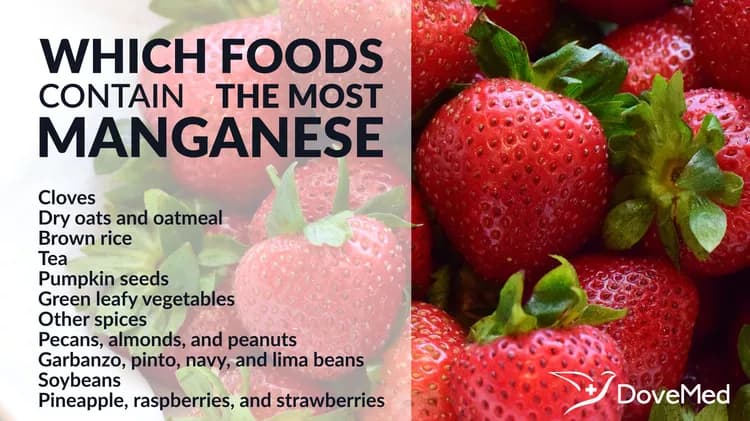Manganese is one of the important mineral elements of the human body. Although manganese is a trace element and comprises only 15-20 milligrams of the adult body mass, it is believed to be indispensable to the formation of bones and skin collagen. We receive this mineral in food, mostly from the vegetables and fruits (plant food) that we consume.
Manganese is an essential nutrient that may be necessary to protect us against skin damage from the sun and other skin conditions including the healing of wounds. Manganese is thought to play an indirect role in blood sugar control. The synthesis of certain carbohydrates, proteins, amino acids, and cholesterol involve manganese-activated enzymes. Manganese is effective in treating osteoporosis (a condition of weak bones) together with other minerals. Anemia and some emotional and mood conditions due to premenstrual syndrome (PMS) may also be improved with manganese.
Certain body conditions, like iron-deficiency anemia and chronic liver disease, are known to increase manganese levels in the body. Excess manganese in the body may cause manganese toxicity, affecting the brain and central nervous system and in turn, causing neurological symptoms. Manganese toxicity may also occur due to inhalational exposure of chemicals and products, and from groundwater sources. Manganese dust from compounds can contaminate open drinking water sources.
Currently, the US National Academy of Sciences, Food and Nutrition Board does not provide a recommended dietary allowance for manganese. However, there is an adequate intake (AI) value for manganese, which is 1.2-2.3 milligrams/day for male children and adults, and 1.2-1.8 milligrams/day for female children and adults. The AI during pregnancy is 2 milligrams/day and higher at 2.6 milligrams/day for lactating mothers. It is always recommended to take the advice of a suitable healthcare professional before bringing any alteration to your regular food habits and diet.
Some manganese rich foods include the following:
- Cloves: An aromatic spice used in cooking and certain medicines
- Dry oats and oatmeal
- Brown rice
- Tea (both green and black)
- Pumpkin seeds
- Green leafy vegetables that include spinach, collard greens, and kale
- Other spices such as cinnamon, black pepper, garlic, turmeric, and basil
- Pecans, almonds, and peanuts
- Garbanzo, pinto, navy, and lima beans
- Soybeans: It is a significant source of protein, apart from being rich in many minerals.
- Pineapple, raspberries, and strawberries
If the dietary intake of manganese is low and it leads to a deficient state, then it may cause certain chronic disorders such as osteoporosis (especially in women), diabetes mellitus (due to glucose intolerance), and seizures. Symptoms of low manganese levels include fatigue, asthma, migraines, gastrointestinal disorders, low blood sugar, and high cholesterol levels.
References:
Vuori E, Makinen SM, Kara R, Kuitunen P. 1980. The effects of the dietary intakes of copper, iron, manganese, and zinc on the trace element content of human milk. Am J Clin Nutr 33:227–231.
Pennington JA, Schoen SA, Salmon GD, Young B, Johnson RD, Marts RW. 1995. Composition of core foods of the U.S. food supply, 1982–1991. III. Copper, manganese, selenium, and iodine. J Food Comp Anal 8:171–217.
Davidsson L, Cederblad A, Hagebo E, Lonnerdal B, Sandstrom B. Intrinsic and extrinsic labeling for studies for manganese absorption in humans. J Nutr 1988; 118:1517-21.
http://umm.edu/health/medical/altmed/supplement/manganese (accessed on 11/25/2014)
http://www.nlm.nih.gov/medlineplus/druginfo/natural/182.html (accessed on 11/25/2014)
http://www.whfoods.com/genpage.php?tname=nutrient&dbid=77 (accessed on 11/25/2014)
http://www.epa.gov/teach/chem_summ/manganese_summary.pdf (accessed on 11/25/2014)
Helpful Peer-Reviewed Medical Articles:
Powers, K. M., Smith-Weller, T., Franklin, G. M., Longstreth, W. T., Swanson, P. D., & Checkoway, H. (2003). Parkinson’s disease risks associated with dietary iron, manganese, and other nutrient intakes.Neurology, 60(11), 1761-1766.
Fitsanakis, V. A., Thompson, K. N., Deery, S. E., Milatovic, D., Shihabi, Z. K., Erikson, K. M., ... & Aschner, M. (2009). A chronic iron-deficient/high-manganese diet in rodents results in increased brain oxidative stress and behavioral deficits in the morris water maze. Neurotoxicity research, 15(2), 167-178.
Bouchard, M. F., Sauvé, S., Barbeau, B., Legrand, M., Brodeur, M. È., Bouffard, T., ... & Mergler, D. (2011). Intellectual impairment in school-age children exposed to manganese from drinking water. Environmental health perspectives, 119(1), 138.
Garcia, S. J., Gellein, K., Syversen, T., & Aschner, M. (2006). A manganese-enhanced diet alters brain metals and transporters in the developing rat. Toxicological Sciences, 92(2), 516-525.
Related Articles
Test Your Knowledge
Asked by users
Related Centers
Related Specialties
Related Physicians
Related Procedures
Related Resources
Join DoveHubs
and connect with fellow professionals


0 Comments
Please log in to post a comment.